Whowatch Extravaganza
Last chance to chime in on the first Patreon vote!
So much this time it’s gotta be categorized!
Classic Who
The Web Planet
The Mind Robber
Spearhead from Space
The Sun Makers
Ghost Light
Lockdown Shorts
Doctor Who and the Time War
Revenge of the Nestene
The Secret of Novice Hame
Shadow of a Doubt
The Shadow in the Mirror
The Shadow Passes
The Raggedy Doctor by Amelia Pond
The Best of Days
The Terror of the Umpty Ums
Non-Who Viewing
Inside Man
It’s A Sin
Sean: In 2020, the world was ravaged with a plague that killed a lot of people. By all accounts, it’s still ongoing, but most of the world acts as if it’s gone because it would make the money sad if it wasn’t. (I actually got the plague twice. Once last fall, the other the week before we recorded the All Star Superman Whowatch Special back in August, about two weeks after San Diego Comic Con.)
As a result, film and television development was put on hold. But there still had to be something to watch, something to do. For many, the choice was made to revisit familiar standbys from decades past like Columbo, MASH, and, of course, Doctor Who. This was done in two separate ways. The first, most famously, were the Twitch Marathons, wherein the entirety of the classic era of Doctor Who (that had not been burnt to a crisp by the BBC’s poor archival work) was streamed for a generation whose familiarity with the show was mainly with David Tennent and Matt Smith.
This was seen as generally a positive development, resulting in a refresh of opinions on Doctor Who as well as the meme LONDON! 1965! As such, we begin this WhoWatch Special with coverage of a set of Classic Doctor Who stories from various Doctor Whos that David has already seen. (“I promise, David will watch the other two Doctors at some point in this project,” Sean said as a threat.)
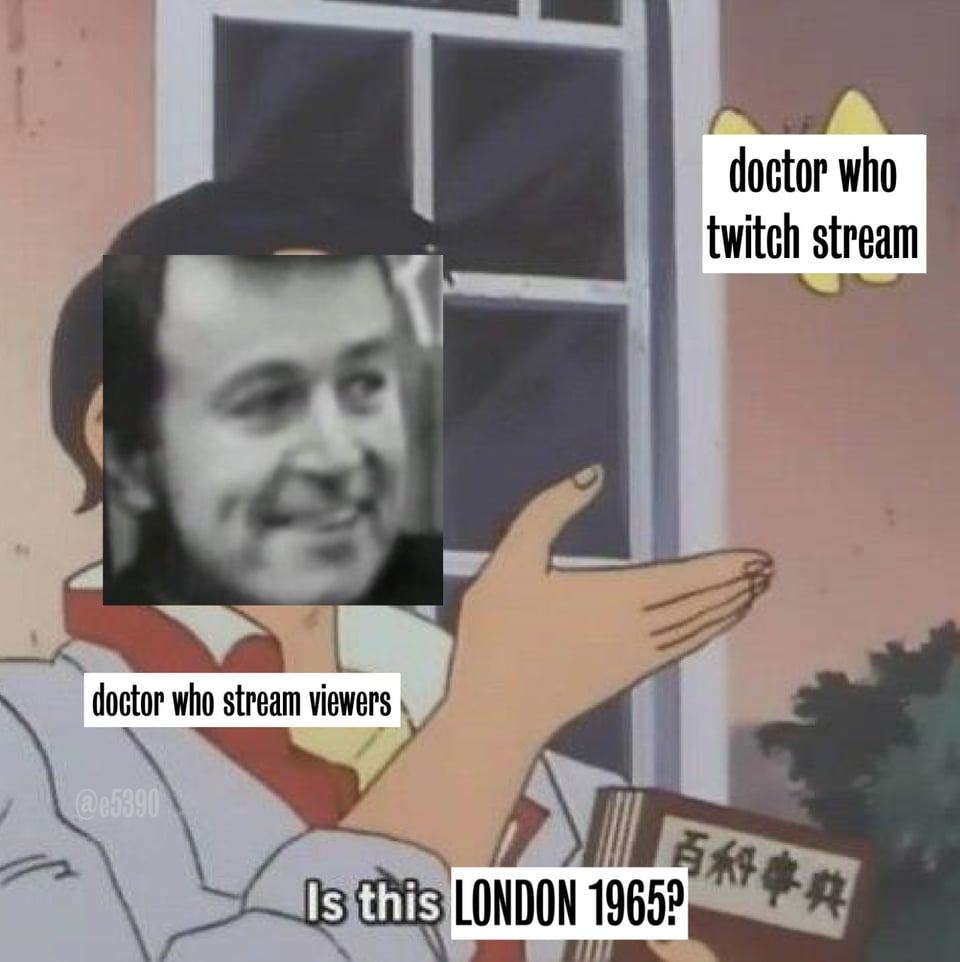
David: In which I’m apparently exposed as a normie, beyond even any other prior Whowatch statements, for saying ‘yeah I don’t get The Web Planet’. I watched it the whole way through and I can imagine it having its charms to the right sensibilities but boy they were not for me to the limited extent I could understand what was going on.
Sean: If I’m being honest, The Web Planet is the only story from this selection that I never actually watched. In truth, I am unfamiliar with the vast majority of Doctor Who, even if you only limit it to the classic material. I just don’t have time to watch every single Doctor Who story ever made. But with The Web Planet, I just had a shit couple of weeks.
David: The Mind Robber was terrific though! In which Troughton and his gang wander outside the cosmos into the Hyperbolic Time Chamber which in turn gives way to a reality that’s half Sandman and half Calvinball, one of the companions is perilously overwhelmed by Scottishness only to then be existentially displaced in an accidental metaphor for the transience of Doctor Who companions, and I find myself hoping I wasn’t assigned it because a superhero’s in it for a few seconds.
Sean: I love The Mind Robber so much. It’s rightfully considered to be one of the best Patrick Troughton stories ever (though, for my money, the best Troughton and Who story comes at the end of that particular season). I love the weirdness of resolving having the previous story get cut by an episode via a surreal bottle show of three people being tempted to madness that ends with the TARDIS exploding and the most avant garde ass shot in cinema history. I love Gullivar and how he can only speak in the words from Gullivar’s Travels. I love how Doctor Who fucks up Jamie’s face because Frazer Hines got Chickenpox. It’s just a great story.
(I also have fond memories of the currently lost media abridged version of The Mind Robber, wherein the Master of the Land of Fiction turns out to be Steven Moffat. Just delightful.)
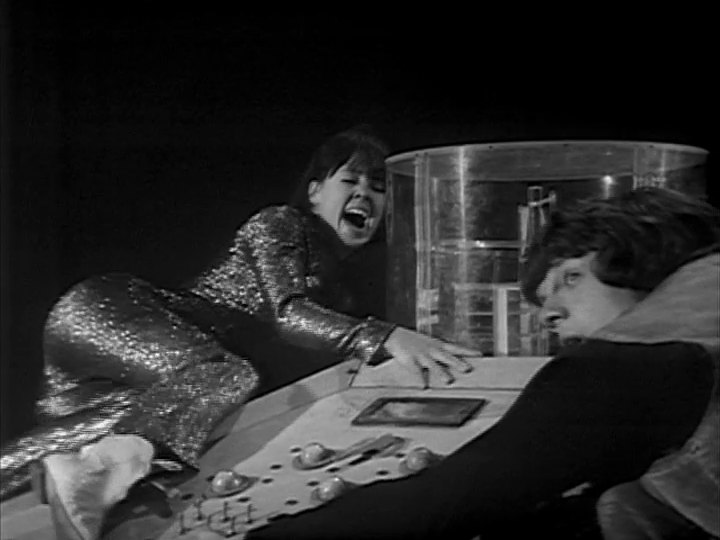
David: That IS a hoot, but as-is, it’s interesting that the episode is unavoidably and cleverly ‘meta’ - The Doctor textually struggling not just against the status of fictional character, but the role of story generator, with The Master of the Land of Fiction who wants The Doctor to take his place notably being a pulp hack necessarily prioritizing quantity over quality - but steadfastly refusing to blink in the face of the premise. The thing ends with the universe throwing up its hands and bluntly putting the literal container of the series back together before cutting to the credits so we never have to talk about any of this again.
Sean: Quite famously, El Sandifer once argued that Doctor Who actually was from the Land of Fiction. That Gullivar’s lines about Doctor Who being a traitor were meant to be taken literally (the actor who played Gullivar, Bernard Horsfall, would play a Time Lord later that season). This, of course, was one of those provocative things many a young critic is oft to write that doesn’t really hold up on closer scrutiny, but the temptation to do so is tantalizing. (As opposed to the hack alternative of “Serialized fiction ought to function exactly like CSI: Miami.”)
David: But Sean don’t you see, the Land of Fiction must be the original home of the Timele- I am riddled with bullets and use up my second Whowatch regeneration
Sean: You only have three more of those.
David: Why do I only get five?!
Sean: Because Doctor Who only got five. Then everyone forgot about the Morbius Doctors because it had been a decade.
David: I guess I may not know how the Mobrius Doctors implied that! Sean, is it infodump time?
Sean: As you know, in The Brian of Morbius, Doctor Who and Morbius have a psychic duel wherein Morbius pushes the image of Doctor Who’s various incarnations on a screen. He then declares that they’ll be going even further back than the first Doctor Who, to the Morbius Doctor Whos. There are eight Morbius Doctor Whos in total. Later in the season, Doctor Who is confronted by the Time Lords in a political thriller. One of the plot points is that Time Lords only get 12 regenerations, i.e. 13 bodies. Eight plus four is 12.
David: Simple!
I dug Spearhead from Space, I’d say Pertwee’s growing on me but given each appearance of his I’ve seen is earlier than the last, I suppose he may have actually lost me overtime. The first appearance of the Nestene here is a nice bit of full circle, and understanding this is the first time we were seeing a regeneration as an established device, the contrast between a different-looking man who’s really the person we know vs. people who look the same but are actually different beings altogether is an inspired baddie choice. However, I must raise a continuity stink by noting Lethbridge-Stewart is familiar with The Doctor in his introduction here, but doesn’t then recognize Troughton in The Three Doctors. I guess he must’ve met Hartnell!
Sean: Actually, Lethbridge-Stewart first met the Second Doctor Who. However, that story was one of many, many stories lost in a fire due to the BBC thinking that an oven is a perfectly good place to archive old film reels. By and large, the search for missing Doctor Who episodes has been on the forefront of many a fan’s mind, not the least of which being everyone’s favorite spineless coward, Ian Levine.
(I call Levine a spineless coward as it was recently announced that the BBC would be releasing all 800+ episodes of Doctor Who on iPlayer. However the son of one of Doctor Who’s hackier writers claimed that doing so for An Unearthly Child was in “BREACH OF COPYRIGHT” Among the many, many Doctor Who people to call this the bullshit this was Levine, being unusually seen as sympathetic given he’s quite loathsome most of the time. Except, the fight ended with the episode getting pulled from iPlayer and the son winning. The son, in a fit of whimsy, decided that if everyone of the woke SJWs left him alone, he’d listen to the negotiations. In the face of the Doctor Who pilot being off the air, Levine immediately apologized to the anti-vaxxer who described the people who cast a Black man as Doctor Who as "corrupted filth".)
As for Spearhead from Space, it’s a delight. One of my favorite details is that, in the initial broadcast, they used footage from a real life documentary of doll manufacturing that contains, in the words of Jack Graham, one of the most politically charged images Doctor Who ever created. As a result, there’s a great Fleetwood Mac song playing in the background. It’s an absolute hoot of a story that introduces audiences to the Bond meets Quatermass meets Monty Python world that Doctor Who would immerse itself in for the next couple of years.
David: I’m shocked Lethbridge-Stewart had shown up before, that really seemed like an introduction! Now there’s REALLY no explanation.
Sean: I mean… have you never pretended to not know who your ex is in public?
David: Next is The Sun Makers, which is a wonky great time that nevertheless bothers me because of how dopily arbitrary the title is. It’d be like calling Star Wars ‘Hyperdrives’, yes that is an element in the narrative but that’s not what anything here is about. I do enjoy that Robert Holmes, as you’ve mentioned in the past, tried to write a conservative(?) parable and instead advocated for the fall of capitalism.
Sean: Yes, for those of you who joined us after the months late All-Star podcast (I’m sorry), Robert Holmes wrote The Sun Makers in response to his taxes being increased. So we end up with a tale about overthrowing capitalism, because that’s Doctor Who’s modus operandi: overthrow broken systems and leave without providing new systems. This works out well in most Classic Who stories (Doctor Who being made into the Satan of an alien world was not the best outcome) and poorly in many a New Who story (Remember kids: Just because you feed Rupert Murdoch to the slug monster in the ceiling, doesn’t mean the foundation he laid goes away).
And dear god, Holmes holds no punches, most notably in the opening scene, where a man’s funeral is worth more than his life savings, so the only solution his son can come up with is the life insurance policy that will kick in should the son commit suicide. Bleak stuff.
That said, is there really an alternate name for The Sun Makers that would work?
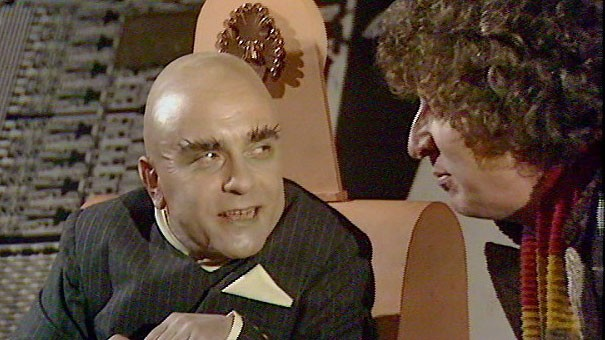
David: Special note to The Collector as one of the best Who villains, a freak too occupied with running his societal machine to enjoy the singular power of being at the top of a ladder built entirely to service him, except where the suffering of others is concerned. Also, I never expected at the outset of Whowatch to be horny on main MULTIPLE times throughout the series, but I’m pretty sure Leela could gut me like a trout and I’d thank her.
Sean: Yep, Leela is certainly… [Blushes so hard, I regenerate.] Hmm… not sure if I like this body, one sec. [Regenerates off screen] No, still not right. [Regenerates off screen] There, that’s good.
David: I was The Web Planet levels of lost with Ghost Light. I had basically no clue what was happening there beyond a vague sense that The Doctor was being even more of an asshole than usual, even if I always like McCoy. Apparently this was the last filmed story of the original series though, even if not the last aired?
Sean: So you know how some comics fans have no idea what’s going on in a Grant Morrison comic… Yeah, that’s Ghost Light in a nutshell. You have to take your time with it, really marinate in its subtextual implications about Empire, Evolution, and God. And, when you give yourself to the madness, the weird narrative implications, you find one of the best Doctor Who stories ever. The speech Doctor Who gives to Ace about all the evils in the cosmos, the things he hates so much, might be McCoy’s best performance yet. The unsettling usage of That’s The Way To The Zoo has given me nightmares. And the house. Oh, what a haunted house!
And that’s not even getting into the fact that Ace wears a suit, which… [Blushes so hard, I regenerate] Really, we’re doing this gag again? Fine, but I’m only regenerating once. [Regenerates off screen]
David: THAT TOO. And I believe you, but viewers may note I had five serials and two full TV miniseries to watch this time, so ‘marinating’ wasn’t really on the table. I had another assignment too though, which we’ll get to presently as the second part of Who’s pandemic era!
Sean: Seeing the success of the Twitch Streams, various fans decided it would be a grand old time to rewatch various Doctor Who stories from the New Series. This resulted in some fan favorites being rewatched like Rose, Gridlock, Vincent and the Doctor, and Heaven Sent. In conjunction with these stories, various behind the scenes people like Peter Harness, Neil Gaiman, Rachel Talalay, and more got to twitter to watch alongside the fans. Even Steven Moffat returned to twitter after being chased off by the worst people. They would tell behind the scenes anecdotes, share copies of the script, and provide witty banter.
In addition, the creators would release new short stories and skits including a Where Are They Now for The Sarah Jane Adventures, a short story where the Thirteenth Doctor decides to align herself with war profiteers, and Neil Gaiman wrote a video diary for Rory. Alongside these Tales of Interest, we have the selection I have given to David.
David: I watched the Rory video diary awhile back on my own time, which naturally resulted in some big blubbery sobs, as did the beginning and ending of The Raggedy Doctor by Amelia Pond in here. The rest are largely enjoyable if relatively disposable; Paul Cornell’s ‘trilogy’ of Shadow stories was lovely if arguably a bit redundant, The Revenge of the Nestene ended on a solid punchline, The Best of Days was nice if arguably also falling in the redundant category (not that I really complain in either case), The Terror of the Umpty-Ums was…nice I suppose, and The Secret of Novice Hame was genuinely very sweet.
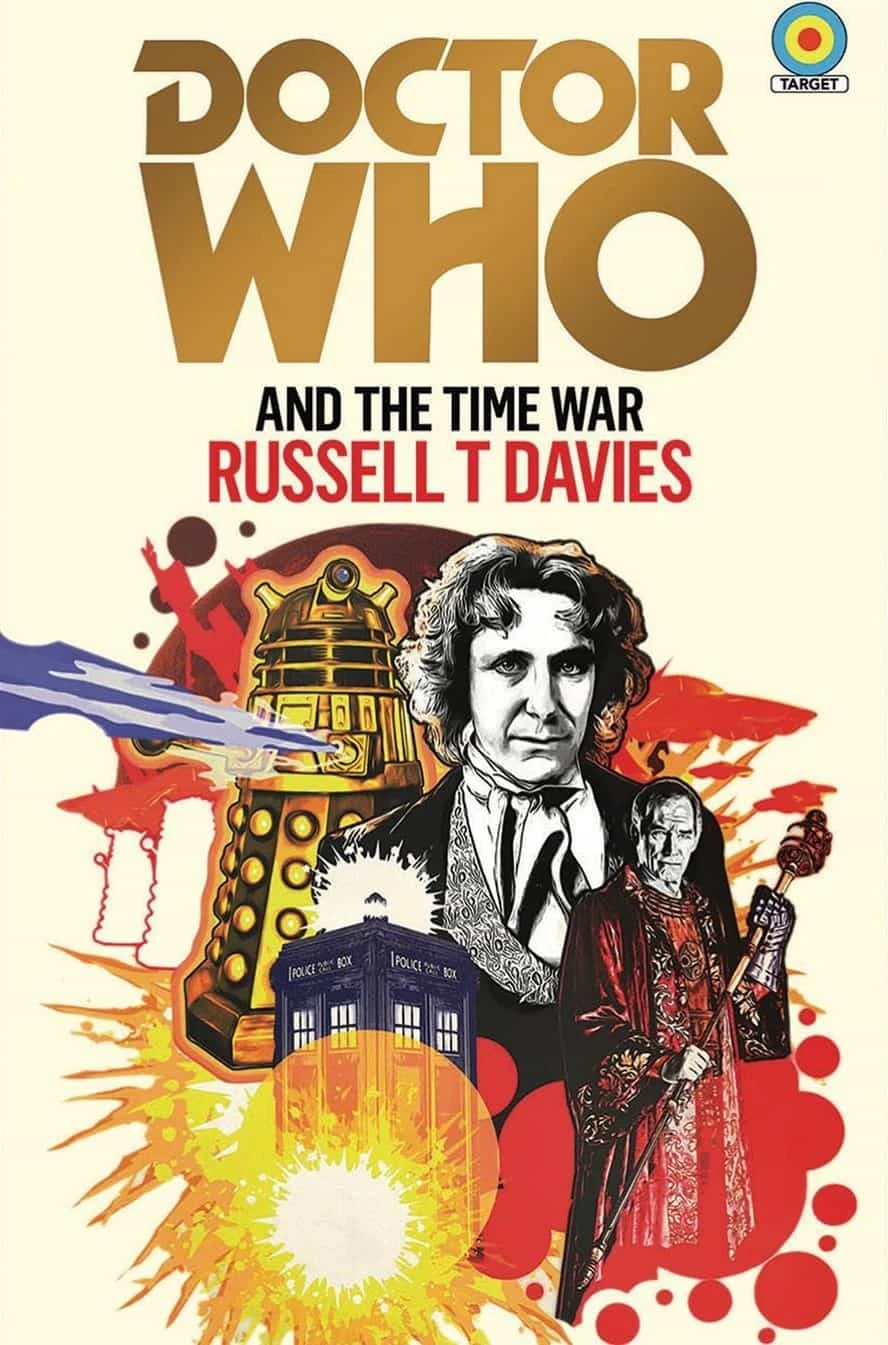
Most interesting of the batch for me was Doctor Who and the Time War. On the one hand, this allowed RTD to give ‘his’ version of the series-reshaping concept he had introduced, as Moffat fundamentally altered the nature and implications of the previously-unwitnessed event with The Day of the Doctor and subsequent adventures spinning out of it. As a comicshead though it’s particularly interesting as essentially giving us what a handful of weirdos like me have pondered for decades: the equivalent of an answer for “so how was Crisis on Infinite Earths remembered by the characters in-universe, to whom in the aftermath there was never a multiverse or a Supergirl, but they definitely all battled against a big dumb Galactus ripoff who killed The Flash?”, or “so what’s the timeline for Spider-Man everybody remembers in the wake of One More Day, besides I guess Spider-Man and Mary Jane themselves who got their own separate set of fake memories answering nothing even though the entire point of that dumb followup comic to OMD was about revealing the ‘new’ history?” Who, on average far less concerned about persnickety bookkeeping than big two superhero comics - give or take a few obvious exceptions - actually bothered to spell it out.
Sean: That comicshead perspective is apt considering there’s an Alan Moore reference in the list of aliens. In some regards, one could argue that the Time War sprung from a bunch of disused Alan Moore ideas filtered by a bunch of Grant Morrison heads into something interesting (before collapsing in on itself into the cooked material we have right now) and then that smoldering wrenching itself being picked apart by Russel T. Davies into backstory material for the relaunch of Doctor Who.
With regards to your comments, I largely agree. Though I think I’m more sympathetic to Terror of the Umpty-Ums. It’s a story that put a smile on my face.
David: I liked it too! As I said, it was nice. I found myself partway through going ‘...wait, are we really doing this?’, but nice regardless once I accepted ‘yes, yes we are’.
Sean: Moffat has always had a tendency to filter towards the edges of metafiction without ever becoming Neil Gaiman and doing stories about stories. It’s fitting, then, for his currently final Doctor Who story to be about what Doctor Who is for in the grand scheme of things. There are some questionable things regarding the nature this takes, but the story is nevertheless quite charming in its ultimate ambitions.
Of course, there’s one final step in this Special we must talk about, and that’s what RTD and Moffat were doing once they were done with Doctor Who.
For Russel, we begin with tragedy. In 2012, during the production of “Why are we doing a Fourth Series of Torchwood in America,” Russel’s partner Andrew Smith was diagnosed with a brain tumor with a limited chance of survival (Smith would ultimately die in 2018). Davies would step aside from major productions until around 2014, when he began work on the extremely delightful triptych, Cucumber/Banana/Tofu about the various sex lives of people in the UK. I have yet to watch the shows, and I kick myself every time I don’t.
After this Davies would adapt A Midsummer Night’s Dream in 2016 and A Very English Scandal in 2018. Both were generally well received at the time (with The Guardian describing the former as “Doctor Who-ish but rather good”), though were very much minor works. In-between those two texts, Davies would write the novelization for Rose, his first work of prose in over twenty years. In many regards, Rose is considered by many to be one of the highlights of the new Target Novelization line of BBC Books adding new characters, highlighting a depth to pre-existing characters, and just being generally charming. Of particular note is the conspiracy nut, Clyde, who is enriched with a sense of love and duty to his family such that his death is played less as a cruel joke and with a bit more humanity.
Davies's big break would be the science fiction satire, Years and Years, wherein we follow a single family in the midst of every awful decision made in 2016 coming home to roost from AI to fascist politicians to forced deportation. One striking sequence from the first episode has the people of London rioting over their money being lost by the Banks, only for one of the police officers defending the bank to realize he also lost all his money and joined the rioters. Overall, the show’s a bit of a mess that ultimately flinches at some of its implications, but it’s still quite enjoyable. (He also did a show called Nolly for ITV, which will air on PBS in March.)
But the showstopper for post-Who Davies is, of course, It’s a Sin.

David: So some personal history here, and I’m curious how familiar it’ll be to some of our readers. During an ordinary school day, a couple of AIDS patients were brought in to discuss their experiences, how they’d contracted the disease and how they’d soon die and how they wished they’d been able to take their decisions back, in order to scare us straight; being roughly middle school aged, the horror was certainly palpable to me, right up to the moment they suddenly put on big smiles and revealed they were actors assigned to put the fear of god into us, but they’d be happy to accept any of our questions. A few years later we got another such lecture, and I actually remember being fooled a second time - and similarly horrified up until the moment of truth - because the whole original thing was so utterly bizarre to me I refused to believe the same trick was being pulled a second time.
Besides an opportunity to ask “did this shit happen to anyone else? That was fucked, right?”, it if nothing else surely DID put the fear of god into me on the entire subject, so I was sure primed from word go to be knocked for a loop by RTD’s niche passion project turned gigantic hit It’s a Sin, a five episode (originally pitched as eight, and gosh would I have loved and dreaded in equal measure to see that version) catalog of 1981-1991 for a gay friend group in London being swallowed by the spread of AIDS. Pulled in large part from RTD’s own experiences at the time - he mentioned Richie’s early denial of the situation was very much him and his friends who figured they could outclever the existence of the virus - the highs and lows here are crushing in an entirely different fashion from the final program we’ll be getting to later. Its joy is some of the most infectious I’ve ever seen on television, and thus its brutality made all the more senseless and nauseating. Just about everyone here turns in a showstopper performance (though Nathaniel Curtis merited substantially more screentime as Ash), but Olly Alexander as Richie is every bit the revelation Davies and Hoar banked on him being. Truly a huge piece of shit, but when you love him anyway, you don’t think of him as ‘a loveable, sympathetic piece of shit’. You think ‘Richie’s complicated’. I think we all knew Richies at one point or another, let off the leash and running headfirst into every brick wall you could put in front of them, collapsing on everyone in their wake.
(A ton of the show is driven by those emotional knots that can’t be untangled, from Roscoe’s relationship with his family and social standing to the various horrifying and obviously unforgivable yet easy to understand parental figures throughout, but Jill’s arc is especially affected by this being filmed pre-COVID and being released afterwards. Her unfounded fear of infection is meant to complicate her efforts, if not her intent given what was generally known at the time, but these days you almost have to remind yourself that being terrified of getting too close to a sick person wasn’t obviously correct. And the battery acid sequence I suppose reminds us of how little we ever really change.)
Sean: In many regards, It’s a Sin provides us with one of the most brutal, uncomfortable variations of Davies’ bad moms trope, wherein we have a mother deluded by her own homophobia to such a degree, she ends up killing her son in isolation. It’s an amazing show about the need for community, how Tories don’t have our best interests at heart, and the complicated lives we all live. On a cosmological level, it’s perhaps on the more optimistic end of Davies’ work, where love and family and acceptance can make people better. You can stop being the worst version of yourself at any time. It’s never too late to heal. You just have to open up first.
That said, Russel is going to hell for using Everybody Hurts for the ending song. Seriously, if you’re going to be that unimaginative and hacky at the end, you might as well just drop the clever bit and actually play It’s a Sin during the credits.
The Doctor Who bit was funny though.
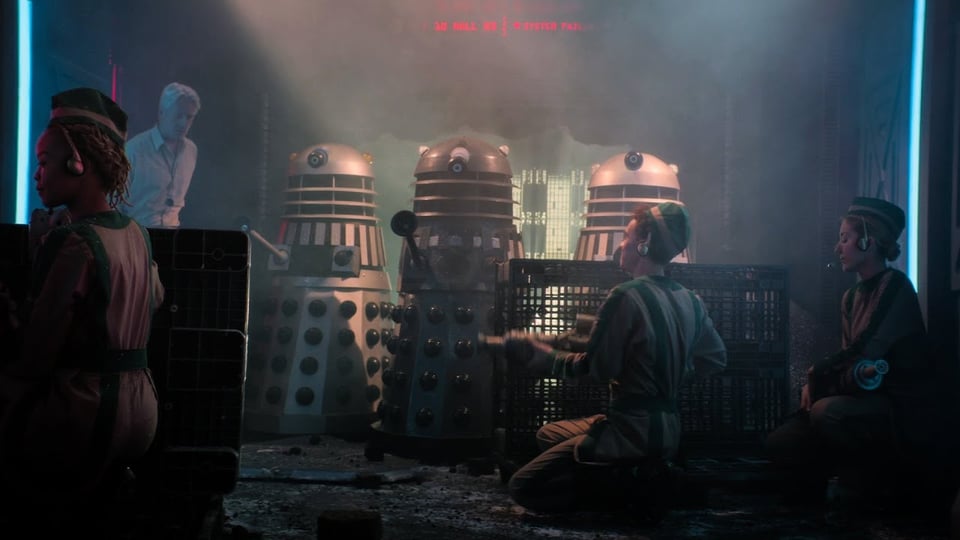
David: I somehow hadn’t connected the dots that Richie’s mom probably did directly kill him, or at least significantly hastened his demise, by cutting off the chemo. To lighten the mood, I’d like to note that Richie’s alias of “Martin Pascoe” reminds us all RTD’s a huge comics dork as well as a Who dork, though his nod towards the latter here was also meant to pay homage to AIDS campaigner Dursley McLinden.
Sean: Of special note is the presence of Lydia West. Lydia seems to have become a muse for both Davies and Moffat in this phase of their careers, and it’s easy to see why: She’s brilliant. She’s someone who has the makings of becoming a superstar with one major role. Prior to It’s a Sin, West first appeared in Years and Years, where you can instantly tell she has the makings of something interesting and has been bounced back and forth between Moffat and Davies.
Sadly, while she’s great in Dracula, West is honestly working against the material. By and large, Dracula is a better show than people give it credit for. The first two episodes of Dracula are some of the best work Moffat and Gattis had done at the time. However, things fall apart around the third and final episode. Or, rather, the middle section of the third and final episode. And where the failings of Sherlock could probably be laid on a mixture of both Gattis and Moffat’s inclinations, the failings here are largely on Moffat’s interests. That said, the final five minutes are brilliant and you’re probably best off just fastforwarding to that bit.
But before Dracula, Moffat would novelize one of his own Doctor Who stories, The Day of the Doctor. In this telling of events, Moffat engages in a lot of structural trickery such that the twelve chapters that appear in the book begin with chapter 8 and end with chapter 13. There are a lot of delightful bits like having the entire book be narrated by Doctor Who in third person to the various perspective shifts in the Zygon chapter all the way to describing the Time War as “the deadliest conflict history will even know began between a race of traumatised mutants sealed into tiny battle tanks, and an enclave of time-traveling academics.” It’s a lot of fun and I’d recommend giving those two novelizations a read. (I’d also recommend Rob Shearman’s Dalek.)
Moffat would follow up Dracula with what could arguably be described as the most obvious Moffat project ever, The Time Traveler’s Wife. In some regards, it feels very much like a Mike Flannigan project (not the least of which due to the presence of his own wife and muse, Kate Siegel). However, this is sadly a double edged sword as the adaptation is, ultimately, faithful to a fault to the original text. There are some charming, disquieting moments (the wedding episode is perfect), but it ultimately feels like retreading old ground.
Prior to the plague, Moffat was to release his first theatrical production, The Unfriend, about realizing your spring break bestie is actually a serial killer and having to be English polite about telling them to leave you alone. It’s a very funny script (and, I’ve been told, a very funny production) with what might be one of the most delightful poop jokes in theatrical history. The initial production, however, is marred by the presence of noted TERF Francis Barber.
Which leads us, then, to Inside Man.
David: So this one is NOT infectiously joyful.
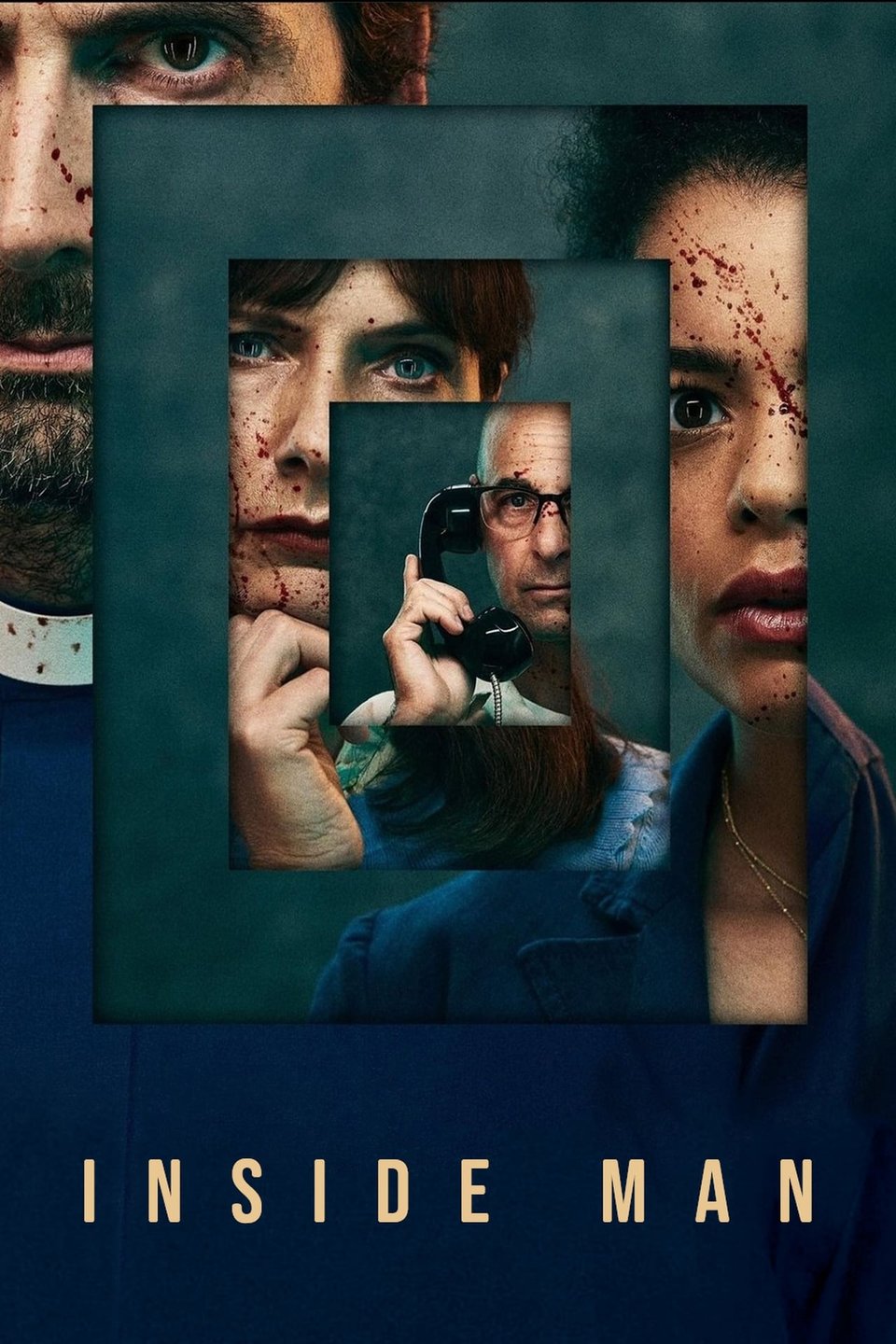
This one is also difficult to describe without both giving away the premise, and also using certain phrases so many times the FBI would probably show up at our doorsteps. Suffice it to say it’s a two-ended show about David Tennant as an English vicar whose family is pulled by the tiniest twist of fate into impossibly terrifying circumstance, and Stanley Tucci as an American death row inmate whose peculiar hobby draws in none other than Lydia West as a reporter tying the strands together.
I loved loved loved this awful, harrowing show. In an odd sense, it draws similar power as Doctor Who’s mixture of the episodic churn interspersed with the periodic divine: the more standard ‘Moffat’ procedural fixtures of Tucci’s segments are shot through with the horror of seeing how serious violence is treated here on Tennant’s end, while the tension of Tennant’s escalating disasters is ramped up knowing the absurd genre scale of what’s coming for him (and also regarding the London segments, this pulls off the magic trick of having virtually everyone involved make INCREDIBLY stupid decisions with regularity, but at no point does it feel implausible they’d panic hard enough to back themselves into these corners). And that genre interplay - one of the many interplays involved here, of sex and violence and the contexts of each, of social contracts and the leeway we’re pressured to give them even as they’re abused, the trust we give others and ask them to afford us, the sacrifices we make for decency vs. the ones we make for maintaining our own self-image - is what leads me to my ultimate thesis on the nature of the show, which is that it’s an episode of a chintzy charming USA Network procedural about an offbeat but noble prodigy investigator taken deadly fucking seriously and blown up to prestige proportions. Tucci even has a signature theme song that plays whenever he shows up!
Sean: I once saw the show described as the most uncomfortable sitcom ever made, and there’s a degree to which that’s true. The show’s structure is very much akin to the typical sitcom story of a misunderstanding that escalates and escalates until it explodes. But where the sitcom usually results in comedy, the explosion here is the destruction of a family because of one man’s inability to not place himself at the center of the universe.
I love this show. I love it so much. Even the more minor players like Dylan Baker and Louis Oliver turn in fantastic performances (though Oliver was honestly stronger in Midnight Mass). It’s an intensely sickening show that does fit nicely into the structure you describe, though one could likewise place that analysis onto Sherlock, with the three series following the first pushing the wheel even further and further before collapsing under its own weight. This is just great on every level.
David: Sherlock absolutely does! Though it’s one of those shows as you note pushing itself to the limit, whereas this is effectively a single episode of a nonexistent show spiraling out consequences and exploring perspectives never typically allowed in that context. And god yes, from Dolly Wells’ increasingly imposing anchor to the entire affair to Atkins Estimond’s delightfully vile ‘Watson’ to Lyndsey Marshal’s near-instant cracking under unthinkable pressure to Kate Dickie’s delightfully odd ‘agent’ to Lydia West if not getting to clean up like in It’s a Sin still going about her job with aplomb, and yes everybody, I know that was Curt Conners as the warden. And of course Tucci’s monster with, as Moffat put it in an interview, the moral clarity of a fallen angel, and Tennant getting to Tennant all over the place. Miraculous show, goddamn meatgrinder of an experience.
Sean: Evelyn must be so proud of her son.
But it is here that we end our little historical stop off. We must, as is our duty, return to the Chibnall era for one last ride. We’re almost done. And with The Timeless Children behind us, it surely can’t get any worse, right?
Next time: David watches Terror of the Vervoids